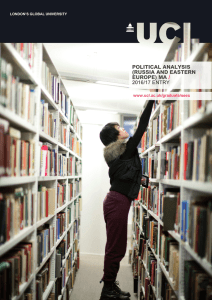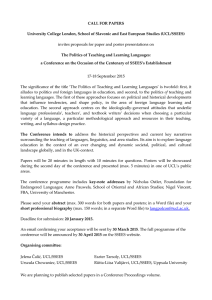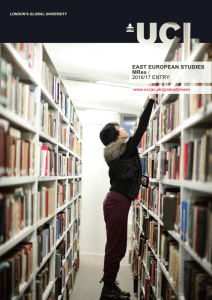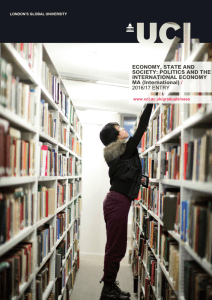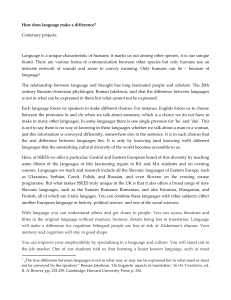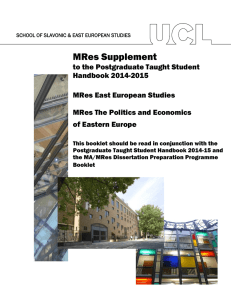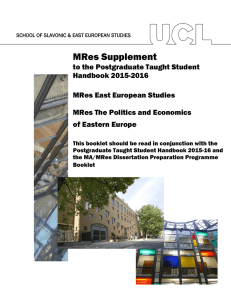POLITICS AND ECONOMICS OF EASTERN EUROPE MRes / 2016/17 ENTRY
advertisement
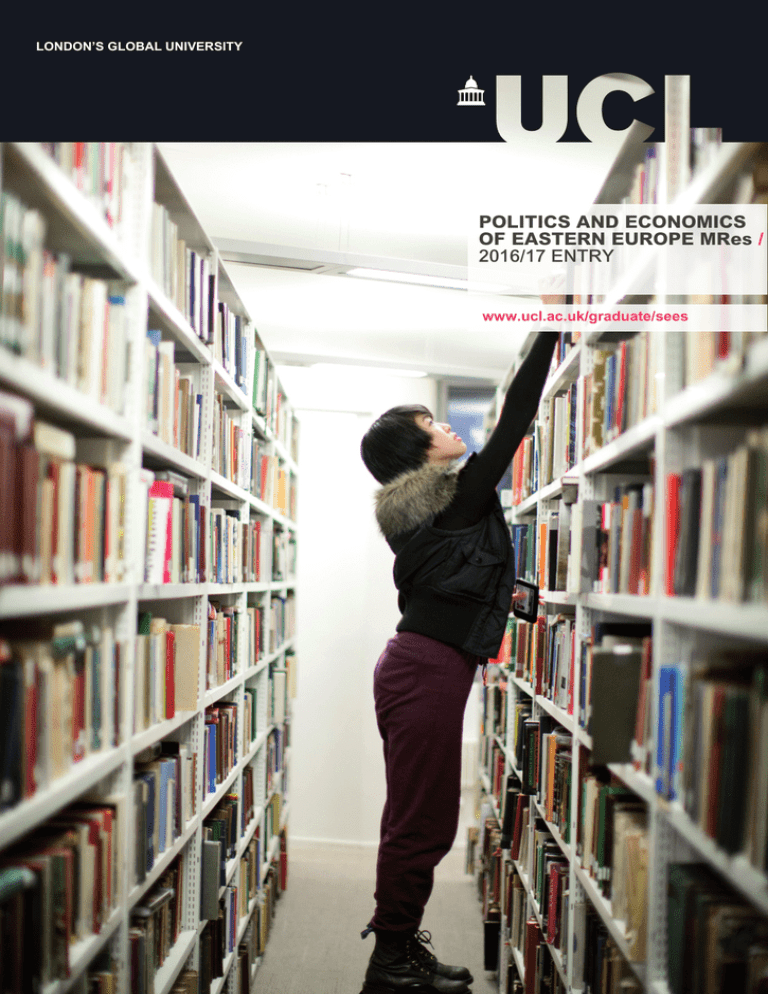
LONDON’S GLOBAL UNIVERSITY POLITICS AND ECONOMICS OF EASTERN EUROPE MRes / 2016/17 ENTRY www.ucl.ac.uk/graduate/sees Politics and Economics of Eastern Europe MRes / The Politics and Economics of Eastern Europe MRes is a research training degree in methods and approaches for studying politics, economics and society in post-communist Europe (including Russia and other post-Soviet states). The MRes is recognised by the Economic and Social Research Council and forms part of our one and three year programmes. Degree summary Students gain a robust multidisciplinary foundation in social science research methods and an introduction to approaches in cultural and historical studies. They develop generic research skills, interdisciplinary and discipline specific research skills, area specific research skills and language skills oriented towards carrying out research in Eastern Europe. // The UCL School of Slavonic & East European Studies (SSEES) is a world-leading specialist institution, and the largest national centre in the UK, for the study of Central, Eastern and South Eastern Europe and Russia. // Located on the edge of Bloomsbury, SSEES offers an ideal location for scholars. The British Library, British Museum, University of London Library and other similar research centres are all close by. // The SSEES library is unequalled in Britain for the depth and breadth of its collections, the majority of which are on open access in the SSEES building. The programme is delivered through a combination of lectures, workshops, seminars, classes and laboratory sessions. Students will be assessed by unseen and written examinations, coursework assignments, essays and the research dissertation. Degree structure Mode: Full-time: 1 year Students undertake modules to the value of 180 credits. The programme consists of four core modules (75 credits), one optional module (15 credits) and a research dissertation (90 credits). CORE MODULES // Quantitative Methods // Advanced Quantitative Methods // Advanced Qualitative Methods // Theories in Social and Political Research OPTIONS // One module selected from the social science programmes available DISSERTATION/REPORT // All MRes students undertake an independent research project which culminates in a dissertation of 15,000-18,000 words. Your career With their specialist knowledge and language skills, SSEES Master's graduates can be found in business, finance, the media, international agencies, charities, diplomacy, international security organisations, the law, and academe. Some graduates advise the Russian, Polish, American, and other governments, and the European Commission. Employability The MRes is intended primarily for applicants planning to do a PhD or MPhil or make a professional career in research and who already have some background in the social sciences. Entry requirements Normally an upper second-class Bachelor's degree in a relevant discipline from a UK university or an overseas qualification of an equivalent standard. English language proficiency level If your education has not been conducted in the English language, you will be expected to demonstrate evidence of an adequate level of English proficiency. The level of English language proficiency for this programme is: Good. Information about the evidence required, acceptable qualifications and test providers is provided at: www.ucl.ac.uk/graduate/english-requirements FEES AND FUNDING // UK & EU (2016/17) entry: £6,575 (FT) // Overseas (2016/17) entry: £17,190 (FT) ESRC funding may be available for UK residents and EU nationals accepted onto the programme. The deadline for receipt of application is the 1 May for the year of entry. Up to five tuition fee studentships are available to prospective Home/EU MRes students at UCL's School of Slavonic and East European Studies. Full details of funding opportunities can be found on the UCL Scholarships website: www.ucl.ac.uk/scholarships APPLICATION DATE Your application All applicants: 29 July 2016 The deadline for all applicants is 29 July 2016. CONTACT Students are advised to apply as early as possible due to competition for places. Those applying for scholarship funding (particularly overseas applicants) should take note of application deadlines. Miss Lilla Bettiol When we assess your application we would like to learn: // why you want to study the Politics and Economics of Eastern Europe at graduate level // why you want to study the Politics and Economics of Eastern Europe at UCL // // what particularly attracts you to this programme // about your research interests and where you would like to go professionally with your degree how your personal, academic and professional background meets the demands of a challenging and truly international academic environment Together with essential academic requirements, the personal statement is your opportunity to illustrate whether your reasons for applying to this programme match what the programme will deliver. Details on how to apply are available on the website at: www.ucl.ac.uk/graduate/apply PDF Updated: May 25, 2016 Information correct at time of going to press. See website (http://www.ucl.ac.uk/ssees) for latest information Email: maadmissions@ssees.ucl.ac.uk Telephone: +44 (0)20 7679 8810
